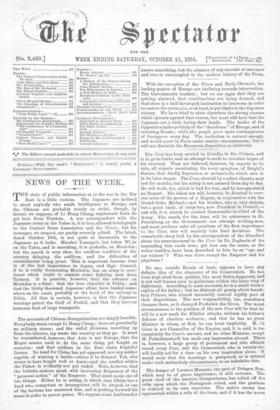The Czar has been carried to Livadia, in the Crimea,
and is to go to Corfu, and an attempt is made to circulate hopes of his recovery. They are believed, however, by experts to be vain, all reports mentioning the worst symptom of Bright's disease, that deadly depression or melancholia which sets in in its later stages. The Czar, cheered by a softer climate, may last for months, but his safety is not assured from day to day. He will work, too, which is bad for him, and he has appointed no Regent. His eldest son will, however, be directed to exer- cise some of the powers of a Regent, in conjunction with the Grand Duke Michael,—not his brother, who is only sixteen, but a great uncle, of sixty-two, now President in Council,— and will, it is stated, be created Commander-in-Chief of the Army. The result, for the time, will be quiescence in St. Petersburg, as the Government can attempt nothing new, and must perforce refer all questions of the first importance to the Czar, who will scarcely take final decisions. The remarkable story told by the correspondent of the Standard about the announcement to the Czar by Dr. Zagharin of his impending fate reads true; yet how can the scene, as the writer testifies, have been described to him by an "eye and ear witness" Who was there except the Emperor and his physician ?


















































 Previous page
Previous page